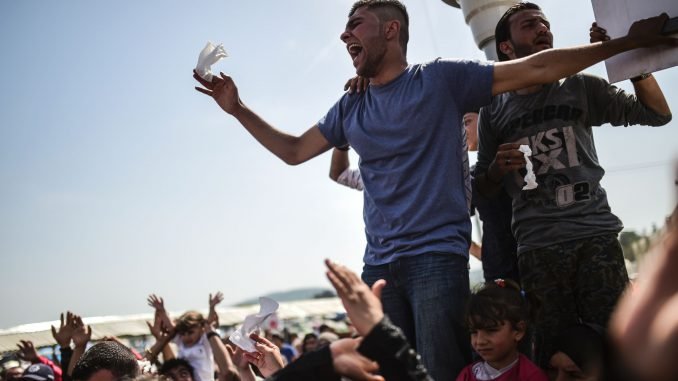
Lithuania’s obligation is to accept 1,105 asylum seekers from refugee camps in Italy, Greece and Turkey in 2016 and 2017. However, the flow of refugees from Syria, Iraq, Eritrea and Afghanistan to Lithuania has been slow, with only 11 asylum seekers coming from these countries to date.
Thorough background checks
Deputy minister of Internal Affairs Elvinas Jankevičius said that the refugee relocation process always proceeds slowly at first, but it is starting to pick up steam.
“We aren’t rushing it, we aren’t encouraging anyone, but we are fulfilling our obligations, and one of our most important tasks in this case is security. That’s why we are performing and will be performing thorough security checks,” he said.
Families and people with university-level or professional educations receive priority applying for asylum. When Lithuania receives their requests from their countries of temporary residence, background checks are performed through various databases.
If these people’s pasts raise no doubts, Lithuanian national security and migration specialists depart for the country of temporary residence and continue the background check, meeting with the selected asylum seekers. If the meeting doesn’t raise any doubts, the refugees are invited to come to Lithuania.
Draft list
More asylum seekers may start arriving in Lithuania in the near future. Jankevičius said that Lithuania’s list includes Syrians, Iraqis and Eritreans seeking temporary refuge in Greece, Italy and Turkey. Once their background checks are completed, a decision will be taken on whether or not they can be relocated to Lithuania.
“Currently, it’s hard to say how many people there will be because the first stage of the process is currently being carried out – we received their applications,” said Jankevičius.
However, it’s not likely that a large number of asylum seekers will arrive in Lithuania this year. Jankevičius says that the relocation process has yet to gain momentum, even though the European Union‘s agreement with Turkey has already produced results getting the relocation process moving.
“As with other states, things will start happening faster in Lithuania. However, I don’t want to quote any numbers yet because they might not turn out to be accurate,” said Jankevičius.
Lithuania isn’t attractive
Linas Balsys, the vice-chairman of the Seimas’ Committee on European Affairs who recently joined other Seimas members on a visit to refugee camps in Greece, claimed that southern European countries were to blame for the slow refugee relocation process because of their delays in providing the documents needed to provide people with refugee statuses. Without these documents, refugees cannot be transferred to other EU countries.
“I visited the refugee camp in Athens, which is considered among the best when it comes to living conditions. But even there, people without any sort of status could wait for 2-3 months or even more. Their documents are processed very slowly,” said Balsys.
Balsys said he believed that Lithuania was implementing its obligation to accept refugees and that the institutions responsible for these processes were prepared for them. He also said that the number of refugees wanting to move to Lithuania was rather small.
Most refugees, he said, did not know where Lithuania was and were sure of where they did want to go – to Germany or Sweden. Given the current situation with the refugee crisis, Balsys encouraged people to consider more than just refugee relocation.
“My understanding is that it is not only important to express our symbolic gesture of solidarity with 1,105 individuals but join forces with the EU and actively help out in solving the EU’s external border defence problems and regulating the conflicts in the countries these refugees are coming from.
“When you see how those people live and how they feel, you understand that it’s no good. After all, Lithuania’s citizens fled after World War II to the so-called ‘dipukas’ camps in Germany. They waited to see where they could go,” said Balsys.
A serious crisis
Renata Kuleš, a representative of the United Nation’s High Commissioner for Refugees, believes that refugees may not be flocking to Lithuania because they do not know the country very well. She also pointed out that Lithuania applies certain criteria to refugees that are checked carefully before refugees arrive.
Kuleš pointed out that the refugees who had relocated to Lithuania were bit by bit trying to integrate into Lithuanian society.
Lietuvos Žinios reported on how Iraqi refugees Yasser and Hansi Al-Any were living in politician Petras Auštrevičius’ home in Juodšiliai, and that Yasser would soon begin working in a furniture factory there.
“Another couple are currently at the refugee reception centre in Rukla, and they soon plan to move to Vilnius. They’re learning Lithuanian and their greatest challenge will be finding jobs and establishing themselves. The man has already organised an exhibition of his paintings he’d painted in Lithuania, and the family has Lithuanian friends. The third family is adapting in the refugee reception centre, and I know less about them,” said Kuleš.
Kuleš emphasised that to help refugees integrate as quickly as possible in Lithuania, they must receive as much information about the host country, its society and how it functions both before and during the relocation process. Knowing about cultural practices is really important as they are often things that may be taken for granted by Lithuanians but foreigners would not be aware of – like timekeeping.
“For example, we must explain that if you agree [in Lithuania] to show up at 9:00, that means that you must arrive exactly at 9:00, not 9:30 or the like. This sort of seemingly simple information is very important for refugee integration and will help avoid certain misunderstandings,” said Kuleš.
Kuleš also said that the global refugee crisis was very serious but that 2016 statistics showed that the number of refugees traveling to Europe through the Mediterranean was falling. Greece remains the country that receives the highest number of individuals, and recently, mostly women and children have been arriving.

Be the first to comment